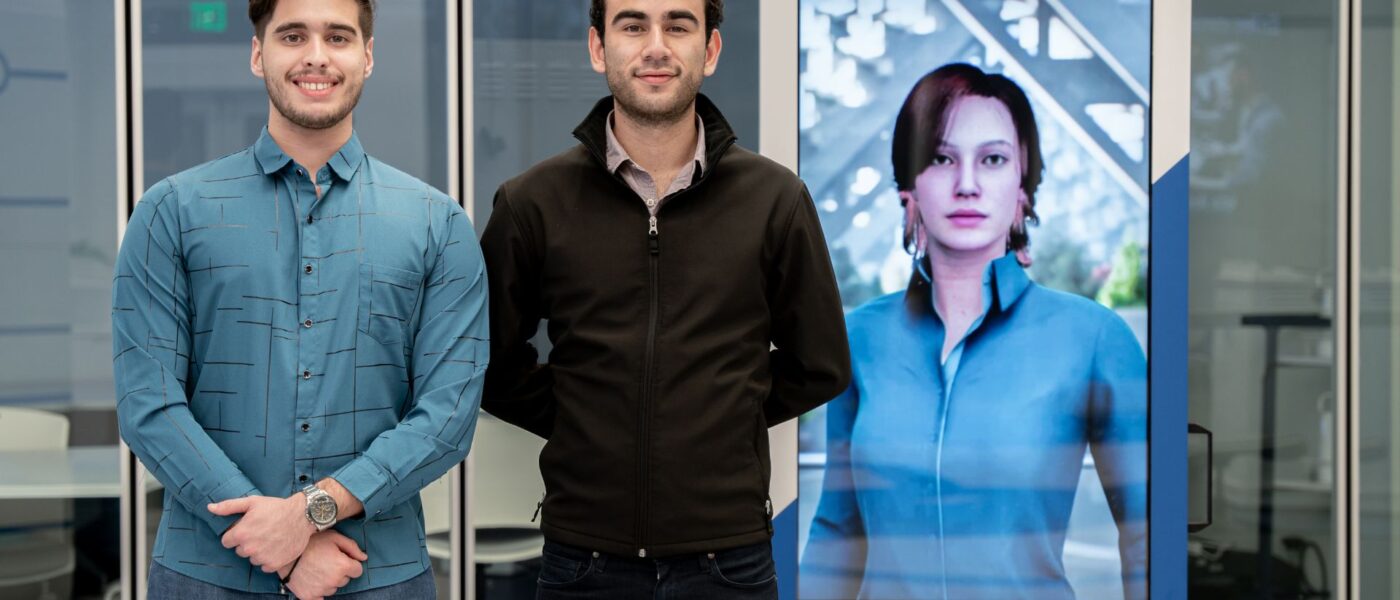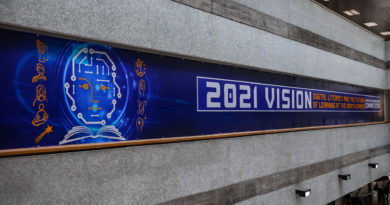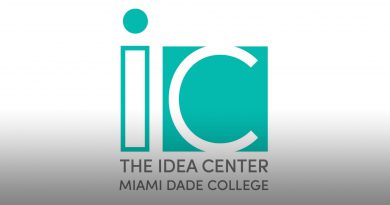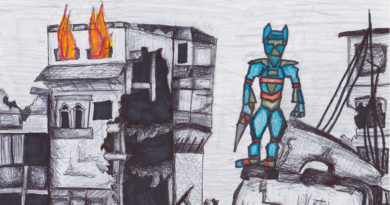Meet Eva: Wolfson Campus’ Digital Human
If you’ve passed by the artificial intelligence center at Wolfson Campus, you’ve probably noticed an unfamiliar face staring at you through a 5-foot screen.
Her name is Eva—a digital human designed to provide critical campus information.
Nicolás Campos, a second-year international student from Colombia majoring in business entrepreneurship at Wolfson Campus, is Eva’s creator.
The Genesis
After vacationing in Miami nearly three years ago, Campos saw the opportunities available for entrepreneurship at Miami Dade College and decided to immigrate to the U.S.
After starting classes at Wolfson, the 22-year-old noticed underutilized kiosks on campus, and realized they could be put toward a more intentional purpose.
That was the beginning of Clera, a start-up business venture that Campos plans to develop into an artificial intelligence-based company that develops “digital humans” like Eva.
These simulated people aim to be a bridge between customers and service providers, such as maintenance workers or receptionists, to increase productivity and enhance customer satisfaction.
A Work In Progress
Alejandro Gonzalez, the executive director of the Idea Center, met Campos when he entered the Blackstone LaunchPad Ideas Competition—a contest where aspiring entrepreneurs pitch business plans—in the fall of 2022. He helped Campos define his business plan.
“I remember he was very gung-ho about it, very enthusiastic,” Gonzalez said. “He did not win the Ideas Competition, but Nico, along with everybody who participated, was offered the opportunity to do one-on-one coaching and he took advantage of that.”
Last spring, Campos presented his idea to Chechu Lasheras, who was the director of the Business Innovation & Technology Center at Wolfson Campus at the time. Lasheras connected Campos with NTT Data, an information technology company that helped Campos develop the first model of Eva using a kiosk provided by the College.
In April of 2023, he presented his model at eMerge Americas, a technology conference where business leaders, entrepreneurs and visionaries discuss their latest innovations.
But Campos realized Eva’s microphone—a karaoke microphone that was plugged into the kiosk where she was housed—was retrieving background noise when users asked questions, leading Eva to provide inaccurate responses.
While Campos possessed the entrepreneurial skills to craft a business plan, he lacked the tech-knowledge to fix the issue.
So he enlisted the help of Samuel Rodriguez, a 21-year-old computer science student at Florida International University, who Campos met last March during a “Hack-a-Thon” at MDC and shares his interest in artificial intelligence.
After evaluating the technical issue, Rodriguez, who has a background in coding and machine learning, coded an entirely new Eva, which became their minimum viable product 2.0 (MVP)—a prototype of the technology—to attract investors.
The improved version of Eva was installed at Wolfson’s AI Center on Jan. 11, replacing the malfunctioning version.
However, two issues arose.
The computer provided by the College to project Eva didn’t have enough processing power to display some upgrades—such as her physical features and MDC-themed background—in high definition.
Campos and Rodriguez plan to host Eva on Microsoft’s Azure Cloud, a platform similar to Google Drive with the capacity to run complex programs without compromising their characteristics.
In addition, Unreal Engine, the platform Eva operates on, recently underwent a system upgrade, requiring Rodriguez to recode aspects of Eva so she can function on the system’s updated version.
They hope to reinstall a fully functioning Eva during the week of Feb. 1.
Eva
The latest version harnesses the power of pre-existing software, like Microsoft’s Azure AI Platform, to collect data about her surrounding environment and provide responses to users’ requests.
For example, someone can ask Eva for the location of the library. Eva then promptly displays the location and directions to get there.
Additionally, students can ask Eva for specific MDC criteria, such as a list of course requirements for an English major or how many science classes are available on each campus.
They can also ask her questions about places to eat nearby and have conversations with her about math, physics, demographics and other topics.
Eva, who sports a blue dress shirt and is fluent in English and Spanish, can gesticulate and display facial expressions.
“While we wanted to expand on the technology side, we also were focusing very heavily on the human side,” Rodriguez said. “The goal is to give [her] more lifelike features, so that engaging with the virtual kiosks will feel natural to consumers.”
The Brain
Eva uses low-code/no-code, which are app development methods that allow Clera to process information from a digital source, such as the MDC website, without having to translate that data into computer code.
In addition, she incorporates application programming interfaces (APIs) to provide relevant answers to users’ questions. This software allows information, like weather data, to be transmitted across digital platforms, such as from the weather bureau’s software system to Eva’s brain.
She also harnesses accurate information from cloud platforms that users already trust, such as Microsoft Azure, Amazon Web Services (AWS) and Google Cloud, to harness accurate information.
These systems, “encrypt [user] data, secures that in a database, and doesn’t allow other people or businesses to access them,” Rodriguez said.
Sky’s The Limit
Campos believes Eva can be the “Amazon Alexa of hospitality.” He sees her as a solution to universal problems in the industry, such as long lines at front desks or understaffed hotels.
In the future, Eva could serve as a digital liaison between customers and staff, performing repetitive functions such as check-ins and check-outs, reservations and cancellations, and providing overviews of hotel activities.
“What I really want is to empower people to stop doing a lot of repetitive tasks, [and instead] utilize their time for something better,” Campos said. “That is what[Eva] is focused on, taking that hard work out so people can have a more seamless experience.”
Click here to subscribe to our bi-weekly newsletter, The Hammerhead. For news tips, contact us at mdc.thereporter@gmail.com.




